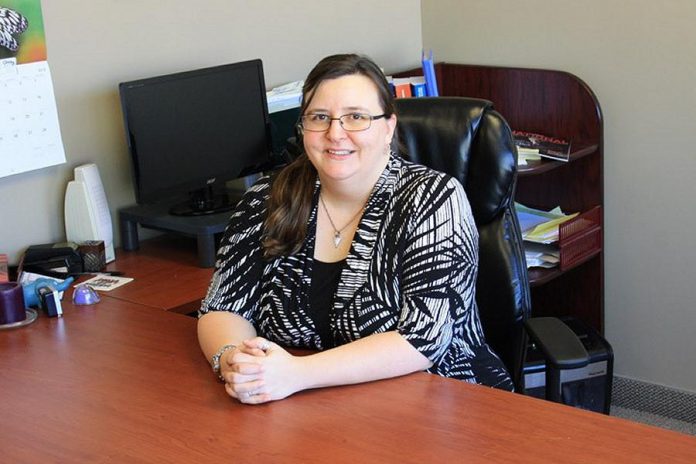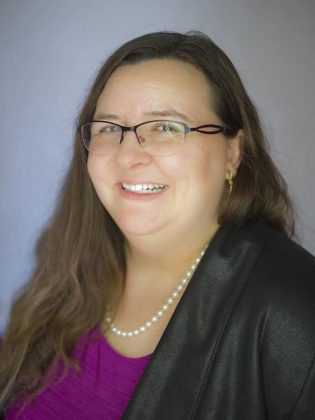
After years litigating matters and watching clients be stressed and frustrated by the legal process, Lindsay lawyer Chantel Lawton decided to change her focus so she could offer support in a different way.
Her evolution of change started in 2012 when she trained in collaborative process. After hours of study and learning, she is now also an accredited mediator — using a whole new approach when it comes to helping clients navigate the challenges of relationship break-ups.
Chantel is accredited through the Ontario Association of Family Mediators (OAFM). OAFM requires the completion of several hours of course attendance in person to learn mediation skills and, in addition to this, Chantel completed 100 hours of an internship with experienced mediators to provide hands-on training.
She now uses every bit of that learning to support her clients during a difficult time in their lives.
Mediation starts with an intake where Chantel meets with both parties to make sure the process is going to benefit their situation. Then the work begins to move both parties out of what can be an uncomfortable limbo that starts when couples decide to split, but don’t know what steps to take next.
“This can be the difficult part,” Chantel says. “A couple might have decided to separate, but they are still living in the same house and don’t know what’s next. This is often where we start.”
Chantel explains that mediation is about helping both parties understand where the other person is coming from and their goals.
“I don’t decide anything,” she says. “I’m focusing on what’s important to both parties and finding consensus. People feel heard more because we’re taking the time to understand and listen. Litigation does not always provide that time.”
What litigation can do is keep both sides stuck in a position, without conversation, with lawyers going back and forth between the couple and judges making decisions that may or may not fit each unique situation.
It can be a long, slow process that can makes a tough situation even tougher for regular people who just want to figure out what happens next with newly changing relationships.
Through the mediation process, Chantel works with both parties to develop a memorandum of understanding (MOU) that can cover anything from living arrangements and financial responsibilities to parenting roles.

Once the draft is ready, her clients take the MOU for a review by their own lawyers — because when she’s acting as a mediator, Chantel is not representing either client as a lawyer.
She likes the process because it’s faster than litigation and can help build relationships through listening and understanding.
“Mediation teaches us to not get stuck in the battle,” Chantel explains.
While Chantel admits that mediation is not always the best way forward for everyone, she also recommends the collaborative process when she thinks it would be more suitable for the separating family. In these cases, Chantel only supports one client and joins other specially trained lawyers to help to resolve the situation.
“Collaborative process looks and feels different than litigation, because lawyers trained in collaborative process focus on resolutions rather than on advocating positions,” she says. “We provide legal advice and information, but our goal is to help the family have a resolution.”
The collaborative process can also include professionals such as financial professionals who help give the family financial advice and planning, and family professionals who provide communication support, help with managing emotions, and assist with parenting supports — all in a neutral way.
“We’re focused on providing support and creating workable solutions,” Chantel says. “At the end of the process, we have a separation agreement for all to sign together.”
Chantel recalls she was moved when seeing her child clients, through her work with the Office of the Children’s Lawyer in the Ontario Ministry of the Attorney General, get stuck in their parents’ court battles for long periods of time. She was convinced there were better ways to deal with family matters.
“You know your family best,” she says. “Courts make people be on guard and they don’t help mend, build trust, or encourage communication.”
Chantel agrees that stress and challenging emotional times may make people behave badly but, through collaborative process or mediation, she believes that there are better ways to resolve disputes.
“You can’t make good decisions when you’re in a highly emotional state,” she notes. “But with the right supports and in an environment focused on resolution, such as the collaborative process or mediation, you can. Mediation and collaborative process can be a better process for your family in the long term.”
Chantel’s goal to make sure that families are okay when they move through difficult change is supported by her own commitment to self-care.
She makes time in her busy schedule to support and nurture herself through her love of music and a strong connection to her family, including spending quality time with her standard poodle, Kaya. She also plays the clarinet with the Kawartha Lakes Concert Band and says it is a great stress reliever — which keeps her prepared to provide support for those she guides through mediation or collaborative law processes.
Chantel M. Lawton, Barrister, Solicitor and Notary Public, is located at 189 Kent Street West (Kent Place Mall), Suite 200, in Lindsay. You can contact her office at 705-878-9949 or info@chantellawton.com. You can also connect with Chantel on LinkedIn and Facebook.
This story was created in partnership with Chantel M. Lawton.

























